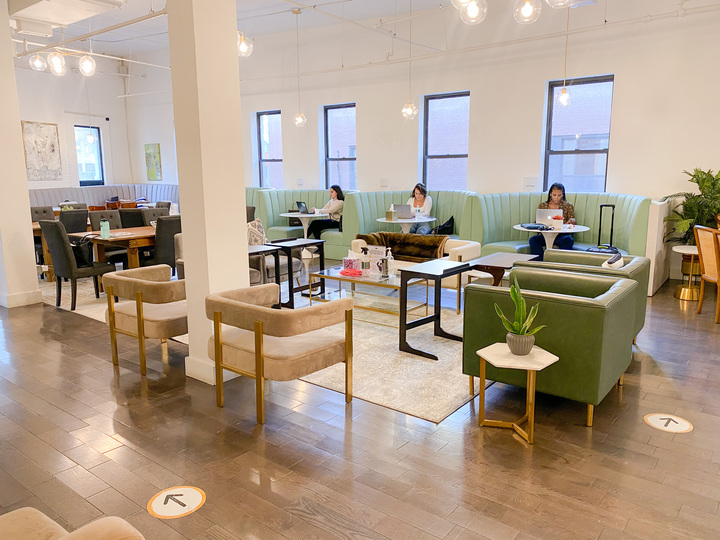How remote and hybrid employees are using coworking spaces: An interview with Shai Card, Head of Memberships & Insights, Luminary
Aug 16, 2023
8 mins read
Employee Experience
With over three years of remote or hybrid work under their belts, many individuals have tapped into coworking spaces to help them rediscover the community of the in-person office they might have lost. While the concept of coworking spaces is not new, the way that remote and hybrid workers, as well as the companies that employ them, are using them has definitely evolved to address the challenges that they face.
What might seem like a pretty straightforward model—a membership for access to a desk (as an individual) or a larger space with meeting rooms (as a company)—coworking spaces are so much more complex than a physical office space, in large part to meet the ever-changing needs of their customers: not just freelancers and start-ups, but rather a diverse range of people from various backgrounds.
We recently interviewed Shai Card, Head of Memberships & Insights at Luminary, a global professional education and networking platform with a physical space in NYC, and Flexspace partner to learn more about the different ways they’re seeing remote work and hybrid employees, as well as companies, utilize their spaces.
Flexspace (FS): Tell us a little bit about your community. Who’s working at Luminary?
Shai Card (SC): We’ve always been more of a non-traditional coworking space, focused on building community. Every day it’s a mix of professionals across industries, including corporate-focused individuals, entrepreneurs, and business owners, and anyone looking to expand their network or learn something new. Whether it’s an individual seeking an inspiring space for personal productivity or a company looking for a hub to bring their teams together regularly, we’re able to meet those needs. Our Community also goes beyond the space, we host weekly curated events to help our community invest in their personal and professional development.
FS: Many people are familiar with coworking space as a) An office space for a smaller business or start-up or b) A membership-based desk for freelancers. But, coworking spaces have evolved far beyond that, right?
SC: Absolutely! The coworking landscape has evolved beyond recognition and I think spaces like ours are the prime example of that. Luminary is not just another office space; it’s a warm, engaging, and welcoming ecosystem designed for meaningful connections. We’re driving the community focus by redefining the traditional experience to become a place where professionals can work on their own terms, in their chosen environment, and access a wealth of networking/learning opportunities. Our space becomes your third home-base location, offering the best of both worlds: the comfort of home meets the sense of community, and you have the freedom to choose. We also provide access to a packed calendar of programs and events every week that our members can attend.
FS: I’m sure you see so many different types of ways that companies are utilizing your space. What has your team observed?
SC: At Luminary, we offer curated group memberships which companies use in so many creative ways! From tutors to yogis, financial advisors to lawyers, industries across the board have found a place in our space. For distributed or remote teams, Luminary becomes their “unofficial office,” offering a flexible alternative to a traditional office setting. It’s a way for employees to escape the isolation of home, reconnect with colleagues, and access productive spaces that go beyond basic desks and chairs. We love that Luminary has become this hub—a dynamic and inspiring space to gather regularly, boosting collaboration and fostering team camaraderie.
FS: Oh, we love the phrase “unofficial office!” Talk more about that, because there seems to be a belief that remote teams don’t necessarily need an office, though research is actually saying otherwise. Are you seeing companies get creative?
SC: While remote teams may not “need” a traditional office, who doesn’t appreciate flexibility and choice? We witness creativity every day—small companies providing their employees the freedom to choose when and how often they want to work at Luminary, and larger organizations offering alternative spaces like ours for hosting off-site meetings or as an additional office space to work from. Access to our programming and events is a huge benefit to these companies as well – we become a learning and development partner. With larger organizations, we’re supplementing what they provide internally and going broader.
Human beings are inherently social—which we can all appreciate—so while we may not need to stick to the same traditional office routine every single day, there’s such value in having the option to connect when we choose. I can speak from personal experience how valuable this is. We have the option to work from home ourselves and I still choose to come in more often than not; having the option is fantastic, but I still enjoy being able to talk through a problem with my colleague without having to worry about whether or not my headphones will connect to my laptop today.
FS: What are your suggestions for how companies could be using spaces like Luminary to help support their teams—distributed, remote, and hybrid—to help make their work life fuller and more satisfying?
SC: In my opinion, it comes back to choice. Spaces like ours offer unique opportunities for companies to support their remote/hybrid teams through choice. From our end, the goal is to provide an environment that offers comfort, community engagement, and flexibility. Through that, Luminary becomes a place where creativity thrives, and professional success is nurtured through meaningful connections, educational content, and a supportive community.
From the company standpoint, by utilizing places like Luminary, and offering employees the freedom of choice to work outside their homes and beyond traditional office spaces, they’re fostering that work-life balance that everyone craves. For example, we have companies that acknowledge that some of their employees want a full week in-office while others may only want one day a week (or even less) – this results in a group that all uses the same ‘office’ space but on their own individual terms.
FS: Flexibility seems to be a theme here, which is something we’re helping companies do at Flexspace. As our partner, how do Flexspace and Luminary come together?
SC: Flexspace definitely helps make our space more easily accessible to companies and provides a convenient way to meet the space needs of their employees. We work with Flexspace via day passes and through bookings to help make that process more seamless.

